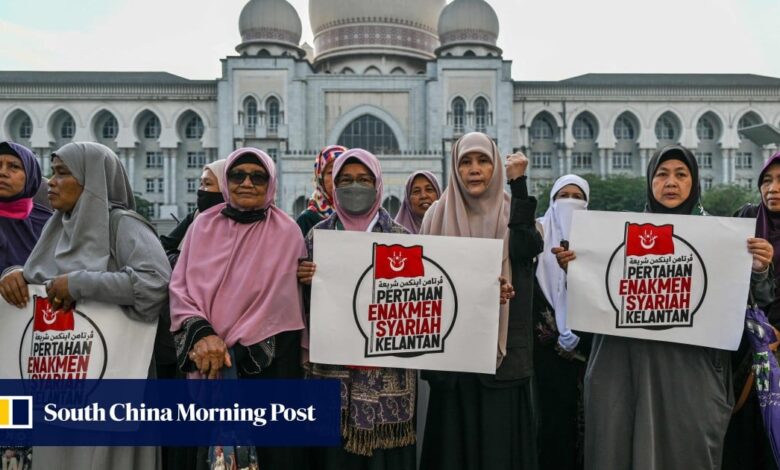Malaysia apex court quashes state’s expansion of sharia law in landmark ruling

The Kelantan state assembly in 2021 passed amendments to the state’s sharia law, broadening its powers to include criminal acts, amid a surge in religious conservatism that has triggered more frequent cultural clashes in recent years.
A nine-member bench in the federal court ruled that the state did not have the power to enact laws that the federal constitution clearly placed under federal powers and under the jurisdiction of parliament.
Chief Justice Tengku Maimun Tuan Mat said only two of the 18 provisions under Kelantan’s amended sharia law passed muster and could be implemented by the state.

The rest of the provisions were “invalid” as they overstepped into federal jurisdiction, Tengku Maimun said when reading out the court’s 8-1 majority decision.
The Pan-Malaysian Islamic Party (PAS), which has led Kelantan since 1990, has been pushing for broader jurisdiction for sharia law, including the implementation of harsh penalties for crimes under hudud, the penal laws of Islam.
Kelantan deputy chief minister Mohamed Fadzil Hassan said they were “disappointed” with the court’s decision, adding that the onus is on the federal government to amend the federal constitution to accommodate greater powers for the sharia courts.
“PMX has a two-thirds majority,” Mohamed Fadzil told reporters outside the court, referring to the country’s current and 10th prime minister, Anwar Ibrahim, and the threshold needed in parliament to amend the federal constitution.
Kelantan-born lawyer Nik Elin Nik Abdul Rashid and her daughter had in 2022 filed a constitutional challenge to amendments to the state’s sharia law a year earlier, arguing that the state does not have the jurisdiction to enact laws that fall under federal powers.
Malaysia’s Unesco plan for Chinese villages triggers fury among Malay groups
Malaysia’s Unesco plan for Chinese villages triggers fury among Malay groups
Kelantan’s amended sharia criminal code would have given state religious authorities the power to act on and punish individuals for crimes such as sodomy, destroying or defiling paces of worship, vice and incest.
The challenge triggered outrage among Islamists and leaders in PAS – which dominates Kelantan’s state assembly – with some claiming it was a ploy to diminish the role and influence of the sharia courts.
Nik Elin said she was happy with the ruling and that it was for the benefit of all Malaysians.
“Alhamdulillah (Praise be to God), after being insulted, cursed … I’m very thankful and grateful,” Nik Elin said when met outside the court, adding that she has received a lot of support every time she went back to Kelantan.
At least a thousand PAS supporters gathered outside the court as a show of solidarity for the state’s push to broaden sharia powers.

Chief Justice Tengku Maimun said the case was strictly to examine whether there was an overreach by Kelantan when it passed the contentious amendments.
“The issue before us has nothing to do with the position of Islam and sharia court in this country,” she said.
In an immediate response to the judgment, Religious Affairs Minister Mohd Na’im Mokhtar urged for calm and gave assurance that the government would continue to guarantee the continued existence of the sharia courts as provided for under the federal constitution.
“Several adjustments to existing plans will be done in line with this judgment. We will implement all existing avenues and opportunities to empower the sharia courts,” Mohd Na’im said in a statement.
Prime Minister Anwar’s administration has grappled with weak support from the Malay-Muslim majority, who voted in droves for a Malay nationalist opposition that includes PAS in the 2022 national election.
Can Malaysia’s Anwar be ‘everyone’s PM’ as he reaches out to Malay-Muslims?
Can Malaysia’s Anwar be ‘everyone’s PM’ as he reaches out to Malay-Muslims?
PAS emerged as the single largest party with 43 out of the 222 seats in parliament, on the back of a “green wave” – so-called to reflect PAS’ primary colour – that analysts say was driven by widespread anger among the Malays over soaring living costs and the perceived failure of the political elites to protect their rights and privileges.
The Malays, who account for nearly 60 per cent of Malaysia’s 33 million population, have long enjoyed a special status as Bumiputra – which loosely translates to “sons of the soil” – affording them preferential treatment that includes university quotas, housing discounts and access to government-guaranteed investment schemes.





